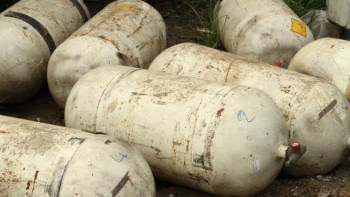Stepping up for menstrual health amid pandemic

The pandemic's effects on middle and lower income people's finances come with a lot of invisible struggles. For example, it has become a severe impediment for underprivileged girls and women's menstrual health. As their expendable money has come down, they struggled to afford sanitary napkins and other feminine hygiene products.
However, a few voluntary organisations have stepped up to the cause, helping alleviate menstrual hygiene issues during the crisis.
TRIKONOMITI
One such organisation is Trikonomiti, an initiative of Youth Hub, a global platform for youths that works with underprivileged women's menstrual hygiene.
The project was initiated right at the dawn of coronavirus, when quarantine and shutdown restrictions were suddenly introduced in the country, making it hard for low-income women to take care of their menstrual health.
As of this month, volunteers of the organisation have distributed more than 3,000 sanitary pads at different locations of the country, including Ishwarganj, Singra, Mymensingh, Saidpur, Narayanganj, Sirajganj and Dinajpur.
Volunteers also go door to door to counsel rural women on menstrual hygiene.
Pavel Sarwar, co-founder of Youth Hub, said, "Like all other volunteering projects, Trikonomiti needs funds to continue their activities. This help comes from donations. However, most people still consider sanitary napkins a luxury good and don't have awareness about the importance of menstrual hygiene. Thus, they are more likely to donate on food than on sanitary napkins."
The organisation has a plan to continue this project even after the pandemic as essential hygiene products are a priority for women.
PROJECT SHUROKKHA
The Arise Help for Child Foundation's "Project Shurokkha" has multiple activities to deal with menstrual hygiene mismanagement.
The initiative was launched in the slums of Patuakhali in May 2020, and later expanded to low-income areas in Dinajpur and in the Assasuni region of Satkhira. Under this campaign, they also provide zinc and iron tablets along with sanitary napkins. Around 500 families have received this aid so far.
They also undertook an awareness campaign in Assasuni. The numbers of sanitary napkins distributed in the slums of Patuakhali, Dinajpur and Assasuni Upazila are 50, 50 and 400 respectively. Medical students accompanied the distribution teams to provide detailed guidance on why and when to use the iron and zinc tablets.
The organisation also established communication with Satkhira Medical College to mitigate or stabilise any health-related issues in the flood-affected regions of Satkhira.
Shahnaz Raihan Summy, chief executive officer of Project Banolota (of which Project Shurokkha is the first campaign) said, "There's a stigma surrounding menstrual hygiene-related essentials. Most of the time, discussions on menstrual hygiene management is seen as a luxury to the women we talk to."
MHAPbd
Menstrual Hygiene Awareness Program in Bangladesh (MHAPbd), a social service inspired by India's "Happy to Bleed" movement has started its journey back in 2015 to help underprivileged women understand the importance of menstrual hygiene management.
Amid the pandemic, they have provided emergency hotline numbers where women can call and order for sanitary napkins. The service is free for underprivileged women, but those who are financially solvent need to pay for napkins which is eventually ploughed back to help continue the initiative.
Collaborating with a number of different organisations, MHAPbd has distributed sanitary napkins to at least 80 sex workers in Dhaka, 100 indigenous women in Bandarban and 400 women in flood-affected areas during the crisis. The organisation is also working with female tea workers to improve their health and hygiene conditions.
So far, they have reached out to over 10,000 underprivileged women to provide cotton made sanitary napkins over the last 5 years.
Farhana Haque Flora, a volunteer of MHAPbd, said, "From the very beginning, we've been distributing cotton pads, which are healthier for both women and the environment. This is because most of the sanitary napkins that are available in the market are highly absorbent, which are harmful to health and are often too expensive to afford."


 For all latest news, follow The Daily Star's Google News channel.
For all latest news, follow The Daily Star's Google News channel. 



Comments